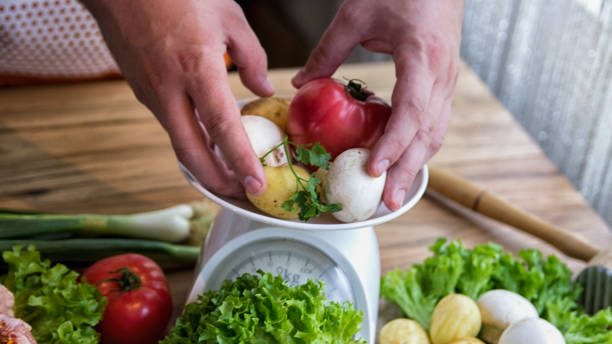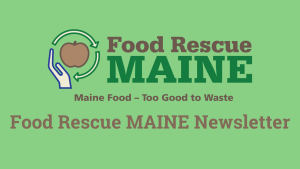
Save Money, Eat Better, and Protect Maine with the FRM Household Food Waste Tracker
Personally, I love to workout- but every year around this time, the local gyms become a bit crowded with New Year’s resolution newcomers. These newbies stick around for a couple of weeks, but usually stop working out by February. Don’t get me wrong- the idea behind New Year’s resolutions is great- I want to be a better me, too. However, these “me-centered” diets, exercise goals, and dry January pledges seem destined for early failure. So what can we do to break the cycle?
Instead of encouraging anyone to make self-focused lifestyle changes, I think that this Covid-filled January is a great time to think about the greater good. And what can benefit others more than saving a precious resource that everyone needs- FOOD! That being said, just last week, Food Rescue MAINE debuted our Household Food Waste Tracker on our website. This month, I want to encourage YOU to try out this brand new, FREE, food waste tracker, and discover how much food your household wastes. With the Household Food Waste Tracker, you can be more mindful of your food: save money, shop less, eat better, help feed your community, and protect Maine’s environment – air, water, and soil…ALL AT THE SAME TIME! The best part- all it takes is slightly tweaking the daily habits that you already have to bring more awareness to the way you handle food. Here’s how it works:
How Does it Work?
The Household Food Waste Tracker is a timely way to get our audience(YOU) to start tracking their food waste. Using the tracker itself is simple– the first week, you will go about each day as usual, but instead of throwing your food waste away, set it aside in a container. At the end of the week, you will measure your household food waste, mark down how many pounds you wasted on your Household Food Waste Tracker table, and add a note about what or why your food is getting wasted . Click here to access Food Rescue MAINE’s Free Household Food Waste Tracker. This will help you to create a baseline for how much food you waste in a typical week and some reasons why.
The next step of using the Household Food Waste Tracker is designed to show you how much a small change in your daily habits can change the amount of food that you waste. Each week, pick and implement one item from the bank of food waste reduction tips in the tracker and then measure your food waste as usual. At the end of the week, mark down how much food you wasted, and compare with your week 1 findings. Every week of the challenge, pick a new food waste reduction tip to try, and see which practices work for you! Feel free to carry over the old food waste tips from each week, or start fresh with each new standalone challenge.
This challenge is one that you can easily customize- feel free to do it for only three weeks, or the full three months. Research says…stick it out for 4 weeks. Once you get started and see how easy it is to make progress and the instant benefits – you won’t want to stop!
Amp Up Your Effort
Now that you are learning about how much food you are wasting, It can be discouraging to just dump all that food waste back in the trash can. Do you want to know what to do with the containers of food waste that you just saved from the trash? Now that you know how much food your household is wasting, the next step is to make sure that food waste stays out of landfills. There are three basic steps to preventing food from being taken to a landfill:
- Reduce- prevent food from going to waste before the food waste happens(i.e. Shop smarter, freeze food, meal prep, etc..)
- Recover- if the food is still good and edible for people, share with friends/family or donate to your local pantry.
- Recycle– If the food is no longer edible, it is still good for the earth if you compost; so make sure to do home composting, hire a composting service that will pick-up food scraps at home, or use a community drop-off site for food recycling. Compost or recycle your food scraps instead of throwing them away.

The Household Food Waste Tracker focuses on preventing food waste with Reduction and Recovery techniques. Unfortunately, no matter how hard we try, there will always be some food scraps to throw away. Instead of tossing the food waste you measure directly in the trash, Recycle it by composting at home, using a curbside composting facility, or dropping your food off at your local transfer station. Click here to find out where you can bring food waste for recycling or donation in your area.
Share Your Journey
Now that you have taken on this fun and challenging project, help us to share your journey! Message us on social media to let us know what challenges reduced your food waste the most, and which challenges you would toss. Tag Food Rescue MAINE in a photo of your favorite challenge. In 2022, use these helpful habits to continue reducing your food waste.
And always remember- Maine food is too good to waste.
-Hannah M., Mitchell Center Student Intern
I’m a novel-reading, chocolate connoisseur who enjoys *short but sweet* hikes, and trying new plant-based recipes.

